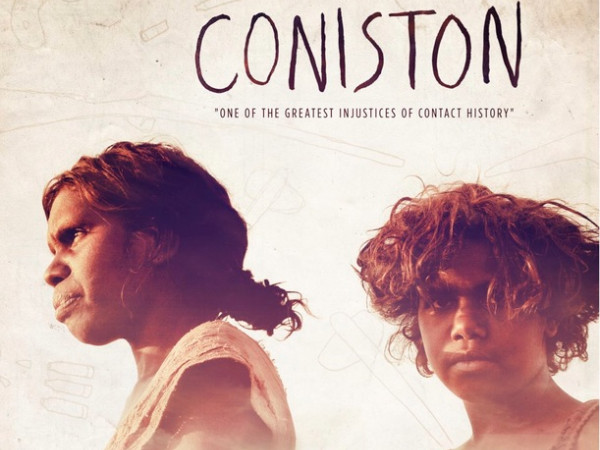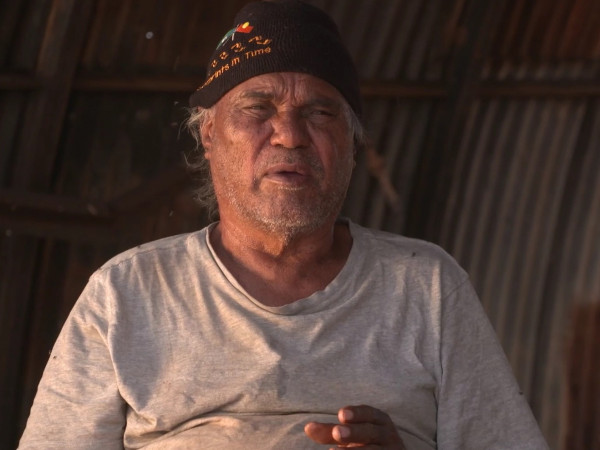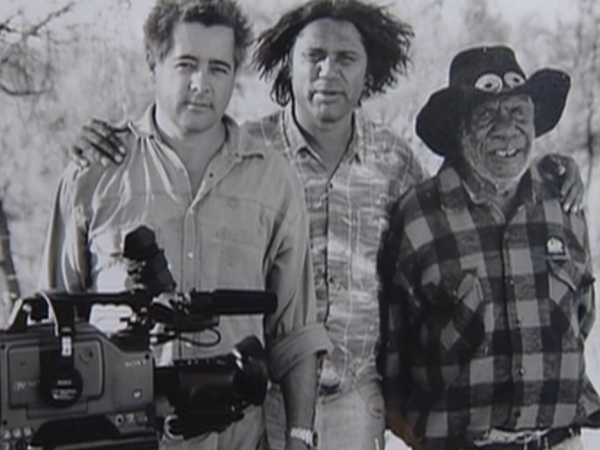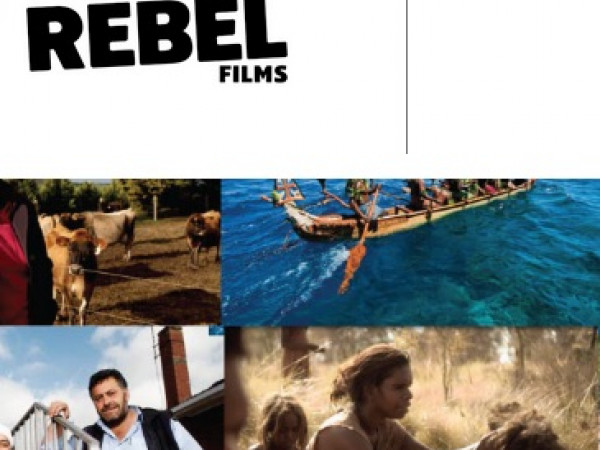David Batty
“You had to film it”
Yeah, I came when I was about…moved to Alice Springs, I was a single father at 18. And so, I moved here when I was quite young with my son. And I started him at school here. So, I was about, twenty two or twenty three when I first came to Alice Springs.
I had a little bit of training in audio-visual media technology in, in Melbourne. And I came here and I just found myself in this, with this job where I had access to all this technology. In those days it was three quarter inch, it was half inch black and white EIAJ system was. VHS was just coming about. So, I was it. I was the only guy in the whole of Central Australia and practically the whole of Northern Territory [who] had access to any video production, any video equipment and any video editing equipment.
People out bush were just starting to get access to three quarter inch video and to VHS and stuff like that. So. I was in a position to be able to edit that material. So, I was, I was in charge of all this equipment that was going out bush to all these communities. And so, this stuff was coming back and people making these little films and videos and sort of home movies and things in their communities. So, I started to do a…I thought, look I put it together and get this Aboriginal girl to compere it, and we called it The Look Show. And it was before the satellite went up, that was before there was mass media hit these communities and…and people just loved it. You know we’d make one about every three months, one of these little shows. And we duplicated on to U-matic …and eventually VHS, and we'd send it back out to all the communities - and so it became like a video magazine. And I think through that I got to see - some people from Yuendumu would come in and borrow the cameras and things, and so I've got an idea of what was going on out there.
Francis Kelly came in from Yuendumu at a very early, early stage. And then…so I was asked then to go out to Yuendumu and do some training with Francis and to train people out there in how to, how to make videos, how to use the equipment how to how to make things in their own language and that kind of thing. So, I go back a long way with Yuendumu. And then of course Eric Michaels hit the scene.
He was a very interesting guy. Very interesting. And he kind of landed in Alice Springs, and he was on this kind of mission to go round Australia to… I think initially he was like on a reconnaissance to see what was happening around the place, because his task was to write a report about the… which, in regard to the impact that satellite television would have on Indigenous people in remote areas.
…Eric was a, he was a really lovely guy - very amiable and very…had that kind of American kind of cool ease and that kind of academic kind of enquiring mind that made you feel sort of special with what you were doing, because all of a sudden someone had come from New York and they were interested in what you're doing. And, so it's sort of made things, all of a sudden it made things a bit more special I suppose. And. And then he applied that kind of academic sort of analysis and rigor to… what he was doing and then put us in the context of all that. And, you know I was always just more on a practical level.
But Eric was on this mission too to start a TV station at Yuendumu and into …it’s kind of like a bit of a ethnographic lab - I suppose in his… but he wouldn't have called it that. But it was his….like an experimental TV station that he wanted to broadcast stuff locally that people were making themselves.
And er…what happened is I sent him out to… I was making a film called Settle Down Country with the Pintupi, right out in the West Australia border. And I…came down with hepatitis, and so, and Eric came around and not any and it was one of the few people that had a video camera, and I said “Eric, I’m too sick to get to Kintore. These people are waiting for me to do some interviews to make this film about the atomic tests and how Kintore was established et cetera. [And can you go out do it?” “Yeah, sure, yeah, I'll go out there, I've got a camera, I got a car you know…”So it was a bonus… I sent him out to Kintore to do this stuff, and on the way back he came through Yuendumu: he kind of checked in to Yuendumu and he kind of thought “Wow this … is a bit bigger, this is something, these people here are slightly more worldly than other people around Central Australia. I could do something here”. So, by the time he got back to town, he said “Yeah, I'm going to do something at Yuendumu”. So, so…he came back. And then he, he came back and went to Canberra where he was based with the Institute of Aboriginal Studies, and he came back with this truck. And the truck was all decked out with all these monitors, and he had the latest little TV cameras and spent a whole chunk of his of his grant money or his budget, or whatever he had, to equip this Toyota with all this gear and stuff.
So then he teamed up with Francis Kelly…he's creative, he’s kind of, he's enthusiastic, and speaks well, and he's a good ‘marlpa’ you know, he's a …good bloke.
He’s one of those guys that – he still does - he's one of those guys - he just, he just pops up, you know. He just kind of… you know, when you least expect it you turn around, and Francis would just walk in the driveway or just walk in the door, or just come back to the community, or you know… but then again he’ll also disappear when you … when you don't want him to as well. I’m very close to Francis where…we've done a lot of stuff together.
He's a showman Francis. So, he wasn't so interested in the kind of the nuts and bolts of Manu Wanya in like the Sesame Street style stuff … I worked closely with Wendy [Baarda] with that - a teacher and an educationalist - and she was, she really knew what the kids needed and wanted in terms of literacy and numeracy and how to how to make things for the screen. Then, we used to get Francis to do these little kind of stories where he where he played this, like a pre-contact, like a ‘myall’, what we call ‘myall’, a ‘myall’ character, like ignorant like he doesn't know the ways of the white man - he's never seen white men before. So Francis would put on his hair string belt and put, cover himself in red ochre and get the spears and the boomerang and the Gudatja(?) feather, Gudatja shoes. And we did all these little scenarios with Francis where he was kind of, you know, walking through and all of a sudden….he'd been hunting and he comes down to off the rock onto a flat spot and all of a sudden all these things pop on to him you know, like a hat and a gun that pops into his hand and shoes come onto his feet - and that's kind of like you know, he just comes into the modern world by magic.
Nearly everything I've done with Francis has been…I've shot it mute. And I've got a wind up 16mm Bolex camera. So that then he could, then we'd post …not post-sync it, we would post voice it. So it was a really good way then of… with Francis and it was a really good way of tapping into the Warlpiri way of storytelling or the Warlpiri way of …of relating story, or relating narrative -because they often go into this a way of talking where it kind of goes into like a whisper, you know like they're talking from, from their subconscious and to be sort of like, something like: “Oh gee, that grass over there is interesting - I might go over there and have a look at that, there might be something living in that…”It's kind of talking to themselves aloud - kind of thing. And so, you get this interesting kind of thought track kind of stuff happening.
It just became something quite iconic for the Warlpiri. It became something that everyone just loved. And they still do - they will still watch it today. That's just got this timeless quality about it. And I think because it's all shot on the Bolex it's kind of got this … If it was just shot or shot on a crummy old VHS video, it might be a bit more forgettable or throwaway, but it just had this unique sort of look about it, and this really kind of funny, doco/cinematic kind of feel about it - and everything slightly sped up because I’d shoot everything at that sort of 18-20 frames or you know, I just varied the frames.
It wasn't …it didn’t just kind of t become like a stuffy language resource in that, in that, you know the kids had to sit down and watch this thing, in how to how to speak Warlpiri or anything. It was more like something to, that would, encourage people to rejoice in their language, that would encourage people to, you know, to talk it more at home and to, and to make it more acceptable, and to make it, make it, make it something that was…they’d see their old people,and to see their family and their friends and all their old people, the teenagers and everyone speaking Warlpiri, you know. So, it wasn't like a….it wasn't like a stuffy old classroom resource. It was it was really like a show, you know- something to sit down and watch and laugh and enjoy.
Well the Coniston massacre story is one that… is very important to, to the Warlpiri people. It's one that they… tell over and over and over again - every person…anyone over the age of 10 or 11 knows the Coniston story and it happened in 1928. So, it's still kind of reverberates in people's memories. It’s, er… The events that happened in it and the impact it had it had looms large in people's minds. And it's a story that when Eric Michaels, the anthropologist came to, the video anthropologist, came to Yuendumu and worked with Francis, it was something that Francis straight up he said… we better do, we’ll want to do something on the Coniston massacre because it's the big story. And…so, they went and did some video and interviewed some people and I've actually looked at that recently again. And so, Francis was very keen to do that then. So, all these years have passed on, and that’s kind of like 25, probably nearly, close on 30 years ago now. And so, Francis got in touch with me..
Francis felt that there's … there's the last few surviving people who were alive who were there when it happened. And, the old people are disappearing at a rate of knots. And they’re… the kind of the keepers of the flame on the story. And I think he wanted to get the true essence of the story and for people to be able to talk… not first-hand, because people then were babies and very small children - their memories of the actual events. But you know the stories …they were handed down to that first-generation people, the first generation down from the story. It was important for him, to want to docu… to get those stories and those people before they passed on.
You know you have to respect the way that things filter down to get the right people to tell the story. You can't you can't just say ‘Oh yes we'll get somebody over there, that's the right, that person knows about, we'll talk to them’. You do have to take into consideration a lot of, a lot of cultural considerations, a lot of… Like, when it came down to it, the actors that we got to play the people in the film …when we're doing the reenactments, or the dramatizations for Coniston, we started looking for people to play the parts. And, every time we’d come up with someone, somebody’d go ‘No, you I can't have them now and that's the wrong person…’. And then we get some guy turned up…we were getting desperate to find people to be in it, and we've got this guy who is just really fierce and warrior like, he was really keen, he wanted to be in it and wanted a contract, you know. And Francis was in Adelaide at the time, and I rang up Francis. And he said ‘Oh no, I can't have him, no I can't have him can't have him now….I’m not going to be happy about that, you know, he's the wrong family, wrong, wrong person’. So, I said ‘Well, look, I've got to get some…’ ‘Well it's gotta be, it's gotta be, Harry Jones's family’. Harry Jones lives on this outstation, which is the closest people to where the massacre occurred. And they are all the direct descendants of the people who were in the massacre. So, that's who we ended up going with - we ended up going with all the members of this family who are direct descendants of the people in the story. And I didn't go out of my way to do that, but that's just the way, by the filtering process or just by, by being guided by Francis and cultural protocols and everyone else. That's just the way it ended up. So, and then they turned out to be absolutely brilliant.
They're not only not actors, but they're the appropriate and the right people according to all the Warlpiri.
Look, it’s our technology. You know, it's whitefella technology and…. And…so…. Yapa [the Warlpiri] don't get excited about it. They don't embrace it. They don't kind of go ‘Oh wow, looking through the new brochures …you can do this, you can do that.’ - like we would you know, like, chatter about all the latest stuff that's happening with all this television technology, information gathering stuff - but they don’t. They're not, they don't really care that much.
…a video camera is just a camera that they can use to, for someone to tell a story. You know. They don't, I don't think they get too fixed on - you know - I think it's a whitefella notion to be thinking that they are using this to do this thing in a particular way that that's really only, that's got to do with their perception of …reality or they're … I just think that's a bit of an academic wank myself…
I don't think that's true, all that stuff, Eric made all that up, I think just so he could go to conferences and talk about that sort of stuff. I really don't think that's the case at all.
…I don't know, sort of sad what's happening there's a…over the years, over the decades there's been a sense that people will get like, the whitefellas or myself or other people would come to town, you would spend some time here. You would hopefully train up Aboriginal people to replace yourself, or teach them skills and then you’d go away and they would replace you. That didn't happen.
I think Francis, Francis was always very keen in the earlier days - but not so much these days, people aren't so much these days. Before it was whatever happened, you had to film it, as proof. You had to. Yeah. If some Senator came out for a meeting, or there was some politician or some notable person came out and they had to speak to the community it had to be filmed. And I don't know if anyone ever watched it back again. But yeah…. But there was a lot of storytelling that was captured as well.
At that time there wasn't any broadcast television. And so now you've got satellite TV, you've got, any of these, all these communities have got commercial TV, they've got SBS, they’ve got ABC, they've got a number of TV channels to choose from. So, you know the days of people sitting around and still eagerly watching this this stuff that someone shot out bush somewhere, and you know I'll jump a jump but telling a story of the Tjukkurpa that went through here and there was some mythical creature form that mountain and you know and,… people filming that coming back and playing it on the on the screen everyone seeing it and watching it. Those days are gone. …It's not. Yeah and it's…. everyone just watches TV like we all do now…
I think there’s…a lot more consumerism. People want a lot more things of the, that the white men … all of a sudden they're just watching all these white middle class people, all over Australia and all over the world with nice cars, nice clothes, eating all these beautiful things, there’s cooking shows, you know: there's all this endless amounts of stuff and I think if you're sitting there you …would be feeling a bit kind of on the fringe of things a bit alienated or you'd be thinking you want that. I want some of that stuff too, you know and… probably in their eyes too it's probably diminished a lot of importance that they held for …a lot of their cultural values possibly and… ceremonial activities…
I think consumerism, I think a lot of things have just had a huge impact on Aboriginal people. I think, I think it's just too much. I think everything is just too much for, for bush people. You know, when you do live - and I've just spent a lot of time with.. really bushy people living out there, and loving their bush tucker, and every moment spending, looking for things, looking for bush tucker, and hunting and doing things in a traditional way, and,… strong family, and you know I've just spent a few weeks with a few families like that. And you just kind of think, you know, this world where we are now with the technology and the TV and the consumerism and the demands and time and, and work and stuff. It's just too much. I think it's just too much for people…they don't… And then they just retract…and they just become less interested.. And yeah, it's a difficult time for people. But I don't know whether things ever will improve




